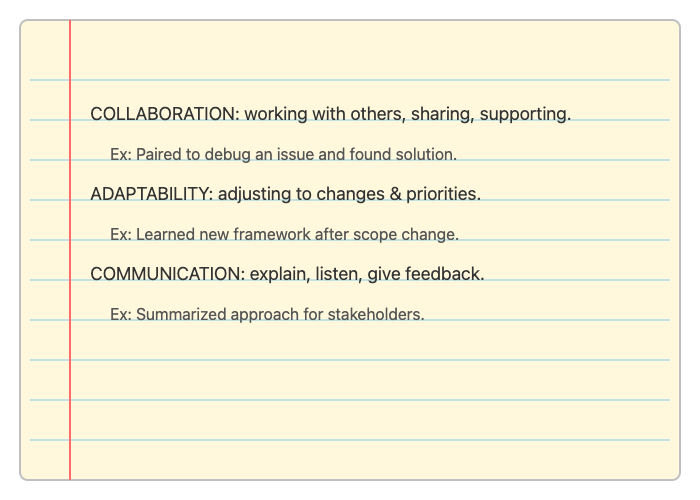Building a high-performing engineering team isn’t just about technical expertise — it’s about finding people who can collaborate effectively, adapt to change, and communicate clearly. The right soft skills help your team solve problems faster, share knowledge, and keep projects moving forward, even when challenges arise.
As you interview and evaluate candidates, you’ll face situations like these:
- Figuring out which soft skills are most important for engineering success
- Pinpointing the specific soft skills your team or role needs right now
- Listening for and evaluating real examples in candidate stories that show these skills, using structured behavioral questions
So, where do you start?
The three soft skills that drive engineering success: collaboration, adaptability, and communication. These are foundational, but keep in mind that other soft skills (like problem-solving, empathy, or time management) can also be valuable depending on your team’s needs.

These skills matter because software engineering is a team sport — success depends on how well people work together, adapt, and share information.
Not every team or role needs the same mix of soft skills. Start by thinking about your team’s strengths, gaps, and day-to-day work. For instance, a backend infrastructure team often needs people who stay calm and solve problems under pressure, while a frontend team benefits from strong communication and empathy for user experience. Remote, asynchronous teams especially prioritize clear written communication.
Here’s how this might come up in a real conversation between interviewers:
- Natalie: I just finished interviewing Morgan. Technically, they were solid, but what stood out was how they described working through a disagreement with a teammate.
- Ryan: Oh? What did they say?
- Natalie: Morgan explained, “I listened to my teammate’s concerns and we found a compromise.” It really showed strong communication and collaboration.
- Ryan: That’s exactly what we need, especially since our team is remote. Did Morgan mention anything about adapting to changes?
- Natalie: Yes, actually. They shared a story about learning a new framework mid-project to meet a tight deadline. That adaptability could be a huge asset for us.
Notice how Natalie and Ryan listen for specific examples in Morgan's stories that match the soft skills their team needs most. This approach helps you connect the candidate’s strengths to your team’s unique context.
Here's a completely fresh approach that avoids STAR method overlap while maintaining focus on evaluating soft skills:
Soft skills are revealed in the details of how candidates approach engineering work. Instead of focusing on whether someone “fits in,” listen for evidence of how they operate in real technical situations.
A practical way to do this is by using Behavioral Anchoring:
- Identify specific, observable behaviors that demonstrate each soft skill.
- Listen for these behaviors in the candidate’s stories, not just general claims.
For example, if you want to spot collaboration soft skills, listen for stories where the candidate resolved technical disagreements, shared knowledge, or supported a teammate during a crunch. Strong indicators include joint problem-solving, giving credit to others, or actively seeking input from teammates.
Tips:
- Track how often candidates reference these anchored behaviors in their technical stories.
- Pay attention to the language they use when describing teamwork, change, or communication challenges.
- Look for patterns that show these skills are part of their engineering toolkit, not just one-off examples.
By applying behavioral anchoring, you’ll consistently identify the soft skills that drive engineering success that are grounded in real, observable actions.
By tuning into these real-world signals during interviews, you’ll move beyond surface-level answers and gain a clearer picture of how a candidate will contribute to your team’s day-to-day engineering challenges. This will help you make more confident, well-rounded hiring decisions that strengthen your team where it matters most. Up next, you’ll get to practice discussing and identifying which soft skills are most important for your team’s unique needs.
